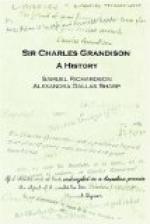I thank you, Harriet, for yours. What must your fellows think of you? In this gross age, your delicacy must astonish them. There used to be more of it formerly. But how should men know any thing of it, when women have forgot it? Lord be thanked, we females, since we have been admitted into so constant a share of the public diversions, want not courage. We can give the men stare for stare wherever we meet them. The next age, nay, the rising generation, must surely be all heroes and heroines. But whither has this word delicacy carried me? Me, who, it seems, have faults to be corrected for of another sort; and who want not the courage for which I congratulate others?
But to other subjects. I could write a vast deal of stuff about my lord and self, and Lord and Lady L——, who assume parts which I know not how to allow them: and sometimes they threaten me with my brother’s resentments, sometimes with my Harriet’s; so that I must really have leading-strings fastened to my shoulders. O, my dear, a fond husband is a surfeiting thing; and yet I believe most women love to be made monkeys of.
***
But all other subjects must now give way. We have heard of, though not from, my brother. A particular friend of Mr. Lowther was here with a letter from that gentleman, acquainting us, that Sir Charles and he were arrived at Paris.
Mr. Beauchamp was with us when Mr. Lowther’s friend came. He borrowed the letter on account of the extraordinary adventure mentioned in it.
Make your heart easy, in the first place, about Sir Hargrave. He is indeed in town; but very ill. He was frightened into England, and intends not ever again to quit it. In all probability, he owes it to my brother that he exists.
Mr. Beauchamp went directly to Cavendish-square, and informed himself there of other particulars relating to the affair, from the very servant who was present, and acting in it; and from those particulars, and Mr. Lowther’s letter, wrote one for Dr. Bartlett. Mr. Beauchamp obliged me with the perusal of what he wrote; whence I have extracted the following account: for his letter is long and circumstantial; and I did not ask his leave to take a copy, as he seemed desirous to hasten it to the doctor.
On Wednesday, the 19-30 of April, in the evening, as my brother was pursuing his journey to Paris, and was within two miles of that capital, a servant-man rode up, in visible terror, to his post-chaise, in which were Mr. Lowther and himself, and besought them to hear his dreadful tale. The gentlemen stopt, and he told them, that his master, who was an Englishman, and his friend of the same nation, had been but a little while before attacked, and forced out of the road in their post-chaise, as he doubted not, to be murdered, by no less than seven armed horsemen; and he pointed to a hill, at distance, called Mont Matre, behind which they were, at that moment, perpetrating their bloody purpose. He had just before, he said, addressed himself to two other gentlemen, and their retinue, who drove on the faster for it.




